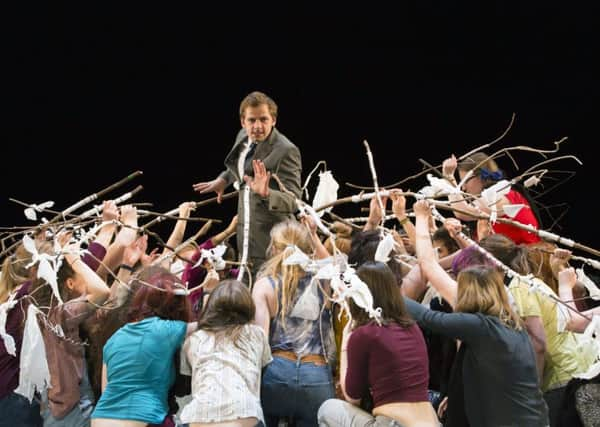Theatre review: The Suppliant Women


Royal Lyceum, Edinburgh
****
The house lights are up, the audience chatters, a group of young women in ordinary 21st century clothes file onto the stage.
A ritual takes place that may never have been seen in Scotland before, as an eminent citizen – Scottish Liberal Democrat leader Willie Rennie, on opening night – is invited to step up, and pour a libation to the god Dionysus, a full bottle of good red wine lashed along the front of the low, accessible thrust stage specially created for this defining production.
Advertisement
Hide AdThen – with a shout of “are you ready, Chorus?” – the performance begins, throwing all the elements of theatre up in the air, and letting them fall to earth again in a new pattern. The play is The Suppliant Women, written by Aeschylus in 423 BC, the first part of a lost trilogy about the arrival in Argos of a group of young women refugees from Egypt.
And what marks out the boldness of this production – in a new version by Greig, directed by Ramin Gray of co-producers ATC – is the casting as chorus and protagonist of 30 young volunteer women from all over Edinburgh, members of the city community.
At some levels, it’s risky; the movement can seem a little awkward, the drama more intense in moments when relative darkness makes its visual impact less diffuse.
Yet in a production driven throughout by John Browne’s astonishing score for drums and aulos (an ancient double pipe instrument), the chorus’s vocal performance, circling around superb chorus leader Gemma May, is wild, startling, beautiful, unforgettable, as they sing, growl and chant their way through a text that has a pressing relevance to current debates about democracy and refugee rights, but that also goes far beyond that, into a dream of radical feminism that seems bold even by 21st-century standards.
Omar Ebrahim is genial and wisely humorous as their father Danaus, while Oscar Batterham is impressive as a young, managerial King Pelasgus.
And the show as a whole sets out David Greig’s stall as Lyceum director with a tremendous, thrilling clarity: for relentless, restless engagement with the issues of the day, for music, dance, fun and civic ritual as an aspect of drama, for a truly Brechtian impatience with the detail of naturalistic theatre, and for a theatre that knows, in every fibre of its being, that citizens of Edinburgh are also citizens of the world.
Lyceum, Edinburgh, until 15 October, then on tour to Belfast and Newcastle.